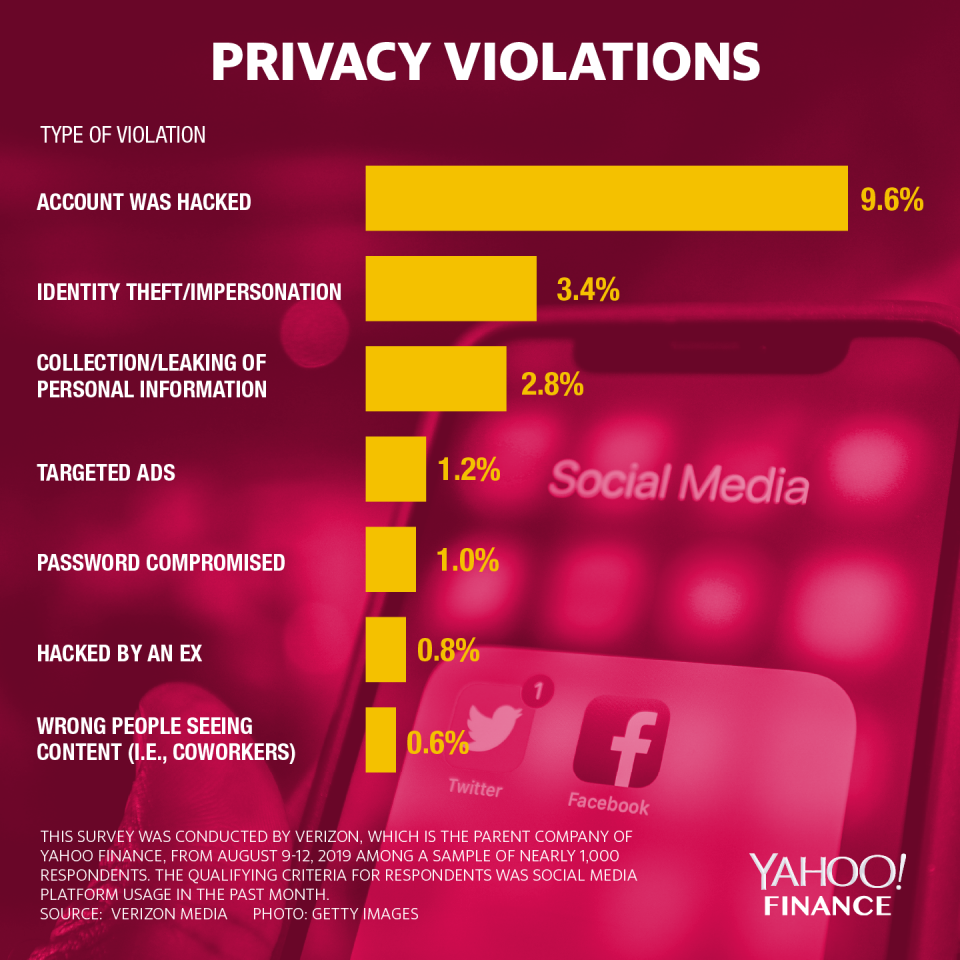Here’s what happens when your privacy is violated on social media
Nine in 10 people say they are concerned about the access, collection, and storage of their personal data on social media platforms, according to a new Verizon Media survey. And about 20% of users say they had their privacy violated on social media.
Data privacy, of course, is also a major concern for federal regulators and lawmakers. Facebook, along with Apple, Google and Amazon, is being scrutinized by House and Senate committees, the Federal Trade Commission, the Justice Department, and state attorneys general. The companies are being investigated for possible anti-trust violations, as well as how these companies handle their customers’ data.
Facebook, which has 2.41 billion monthly active users, recently settled with the FTC for $5 billion after an investigation revealed the company mishandled user data. The Cambridge Analytica scandal, in which the data of up to 87 million users was shared with a political firm without their consent, sparked the investigation.

Yahoo Finance took a closer look at the privacy violations users have experienced on social media, including Facebook, Instagram (owned by Facebook), Twitter, Snapchat, and LinkedIn in an exclusive new study. We included some of their responses below. (This survey was conducted by Verizon, the parent company of Yahoo Finance, Aug. 9-12, 2019, among a sample of nearly 1,000 respondents. The qualifying criteria for respondents was social media platform usage in the past month.)
Privacy violations
One in five users say they had their privacy violated on social media.

Hacked accounts
More than half of respondents (56%) say they are very concerned about the possibility of hackers gaining access to personal data by hacking a company that collects it. And people under 35 were more likely to say they had their privacy violated.
Hacked accounts were the most common form of privacy violation among the 20% of users who experienced privacy breaches on social media. Almost 10% of users say their account was hacked.
“My personal information was hacked and sold. Had to change my passwords.” – Male, millennial
“My Facebook was hacked by an overseas person. Facebook notified me of the odd login location and the hacker had already changed my password so it was very difficult to regain access.” – Female, millennial
“My Facebook account was hacked. Someone used my name and profile picture and was sending messages to my friends in my name.” – Female, Gen X
“Facebook used an unauthorized photo of me in 2010.” – Female, millennial
Identity theft
More than 3% of respondents reported that their identity was stolen via a social media platform.
“Somebody got into my platform and pretended to be me and contacted my friends and family and tried to scam them.” – Male, Gen X
“Someone hacked into my Facebook account a few years back and messaged a lot of my friends and family and sent them pictures of me that weren’t really me.” – Male, Gen Z
Leaking of personal information
Nearly 3% of respondents say that the social media platform they were using failed to protect their personal information.
“I was bashed and bullied on Facebook in a mom group for being a single mom. They found out where I worked and called me at work. It became overwhelming, I was being harassed.” – Female, millennial
“A default configuration with a third party app connected to social media disclosed content that I didn’t want disclosed.” – Male, millennial
Targeted ads
About one-third of the survey’s respondents 32% say they are very concerned about advertisers’ or companies’ ability to use their personal data to send them ads and get them to buy more online. 1.2% of social media users view targeted ads as a privacy violation.
“I find that conversations I have with people seem to be listened to so ads are targeted toward me. Consider this a huge invasion.” – Female, millennial
“Everytime I say something Google is listens and then gives me little tiny pop up ads and I know they don’t respect my privacy.” - Male, millennial
“My boyfriend was talking about this automatic litter box that cleans itself. We’ve never heard of it (coworker told him about it originally) and after our 3 minute conversation I see an ad for one on Facebook. Convinced me they are listening always.” – Female, Gen Z
Wrong people seeing content
Fewer than a quarter of social media users say they’re concerned about the wrong people seeing their private content: 17% say they’re very concerned it will be a coworker or boss; 14% that it’ll be an ex-boyfriend or girlfriend; and 13% say they’re very worried that it’ll be their spouse or partner. Those most concerned that a boss or romantic partner might see private moments were more likely to be male and younger.
Less than 1% of respondents say that this happened to them, however. Their social media data was seen by people they would rather keep it hidden from.
“I had in-laws put their opinion on pictures and posts that they weren’t supposed to see.” – Female, Gen X
“I work at a social service agency and some of our clients had found my Instagram profile and started following me, and I had to make my profile private. I have older photos on my Instagram that I wouldn’t want them to see, and also felt like my privacy had been invaded.” – Female, millennial
Blame for privacy violations
A quarter of social media users take personal responsibility for instances when their privacy was violated. However, about a third of users blame the social media platform they were using.
Gen Z users are more likely to report a friend or family member as being responsible for a privacy breach.
More from Sibile:
Democratic debate: Trump trade war treating workers like ‘poker chips’ in ‘his bankrupt casinos’
Why a Trump tax cut is no longer a winning campaign strategy
Trump’s stimulus hopes may get frustrated by Congress, 2020 politics
For first time since Trump elected, more voters say economy is worsening
